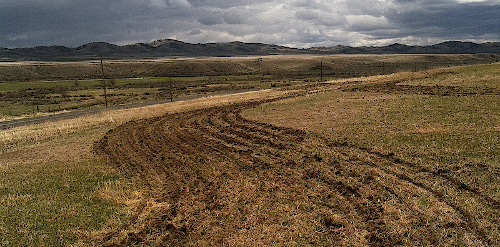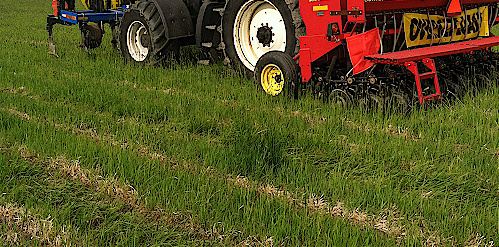
Pasture Renovation, Custom Seeding, Reclamation and Resource Management
Custom Services Offered:

- Polyculture Pasture Establishment and Maintenance
- No-Till Seeding and Corrugation
- Cover Cropping
- Soil/Nutrient Testing
- Alkali/Sodic/Saline Soil Remediation
- Rotational Grazing and Livestock water/fence infrastructure design and installation
- Transition to Organic
- Transition alfalfa stands to a sod-based system
- Rangeland Seeding
- Mining Reclamation and Seeding
- Keyline Concepts Design
- Dripline/Treelines/Shelter Belts
Applications
Sub-Soiling

Dryland We integrate contour farming techniques into dryland areas that normally would suffer from erosion, run-off and/or low water infiltration rates. This process develops root systems and stores more water in the soil profile. It also reduces erosion, keeps the livestock moving and aerates and builds the soil as roots and microbes grow deeper. As a result, forage nutrition increases and drought pressure is reduced in hilly areas. Positive animal health benefits, such as reduced footrot and insect pressure in normally boggy areas, are achieved.

Flood Irrigated Mechanical treatment of flood-irrigated land enables healthy root growth to access moisture and minerals while having air needed for roots to survive. Specialized equipment enables minimal ground compaction, low surface disturbance while lifting and aerating the soil. This process also corrugates the land for renewed irrigation capability. A long term maintenance plan eliminates the need for moldboard plowing in the future.
No-Till Seeding
A key to increasing production on pasture or rangeland is increasing tilth. It does no good to seed into overly-compacted ground. That's why we offer no-till seeding services alongside low disturbance, deep plow pasture management. The deep plow ripping also serves as corrugations for irrigated land.
Option 1 - No-Till Seeding Warm Season Legume Mix
No-till seeding warm season legumes into a cool season grass stand can double tonnage and feed nitrogen into the soil, which grasses thrive on. This is an excellent option for livestock producers to maximize warm season tonnage with annuals while also planting perennials, which will increase production starting in year 2 or 3.
Option 2 - No-Till Annual Small Grains and Grasses Mix
No-till seeding annuals can double tonnage in tired alfalfa stands. This is also an excellent option for livestock producers to increase current year tonnage untilizing the nitrogen which legumes, such as alfalfa, have fixed into the soil.
Option 3 - Strip Till Pasture Cropping
Pasture cropping is an exciting option in the Bighorn Basin. We can help grow a crop without turning the soil.
Other Options and Upgrades
- No-Till perennial forage mix with any option above to upgrade your forage base and nutrition in future seasons.
- No-Till Subsoil forage at time of seeding. Boil the soil - Nothing grows in a brick!
Alkali/Sodic/Saline Soil Remediation
Moving water downward through the soil is the key to reducing sodicity, alkalinity and salinity in arid desert climates. Depending on soil testing results, we may recommend drainage improvements, lime, gypsum, micronutrients, and/or alternative forage options to make land productive.
Pricing and More Information
Custom pricing - please contact Kevin by email using our contact us form or by phone at (307) 254-2582.
For more information, please see our case study page.

